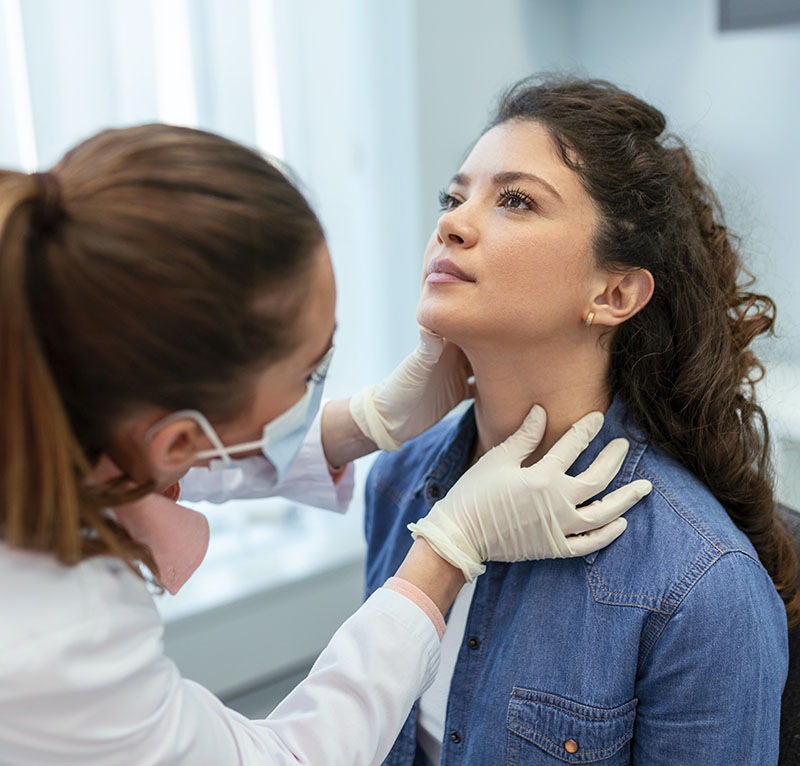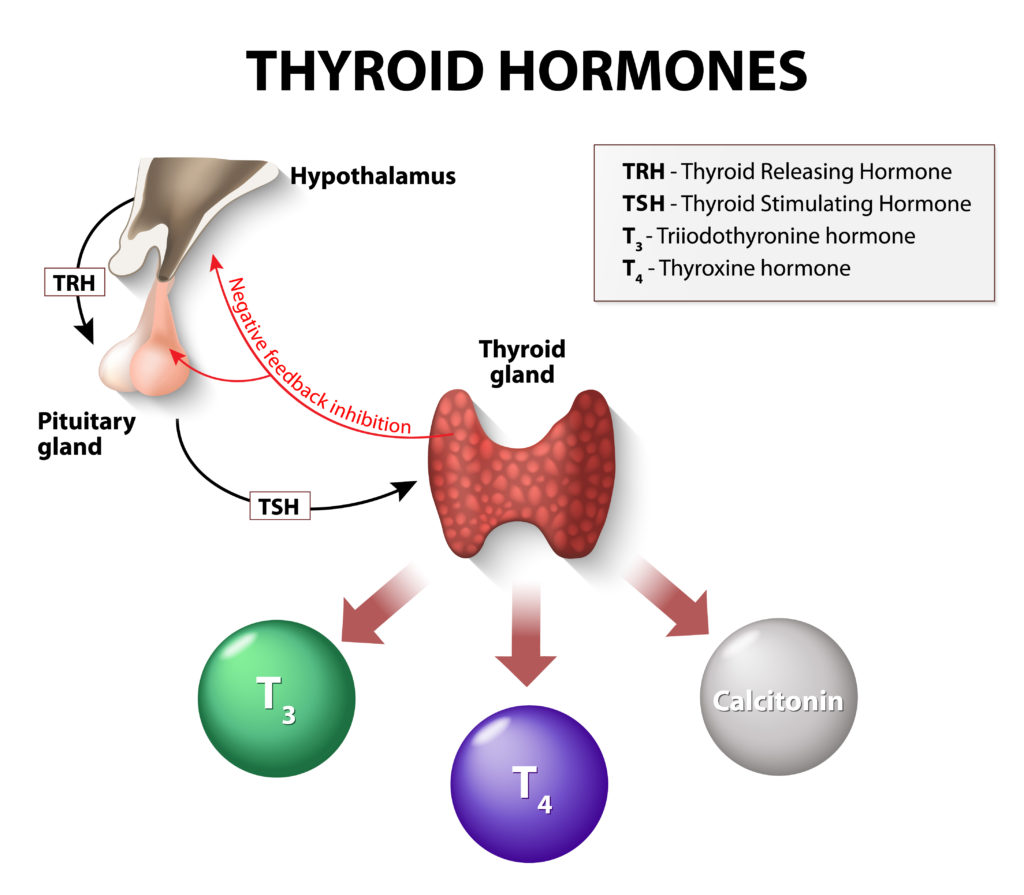We are Thyroid Experts. We Can Get Your Thyroid Right.
Thyroid disorders can cause a multitude of issues, from low energy to weight gain to mood changes and so much more. Yet, most conventional testing and treatment protocols for thyroid issues are outdated.
We see many patients who have symptoms of thyroid disorders but have been told that their lab results are in the “normal” range, so no treatment is necessary. This can create a lot of unneeded frustration.
Another scenario we run into is patients diagnosed with thyroid disorders whose medication is not relieving their symptoms. We can often prescribe a more tailored form of thyroid replacement that will relieve those symptoms.
Our Dynamic Life Health Center in Southlake offers a highly personalized program to treat your thyroid disorder. Our providers have had extensive training in the latest advances in diagnosing and treating thyroid disorders and have had outstanding success in treating an array of thyroid issues.
“As I have been coming to see Dr. Berutti for twenty-three years plus, I have come to trust her opinion and methods. I was not in good health when I first came in and met her. Methodically, she moved through my different conditions one by one. I can see now what the difference her medicine has made. I am 62 years of age and feeling very strong in all body, mind, and spirit. This is due to her knowledge of medicine. I truly recommend her as the doctor for you.” – Paul R.
We Understand Lab Results
As part of our thyroid treatment, we screen for vitamin and mineral deficiencies. We also screen for Hashimoto’s, a disease that causes the body to produce antibodies against thyroid hormone production. If you are diagnosed with Hashimoto’s disease, we search for the underlying or root cause of the disease.
Our testing looks at all aspects of the thyroid gland, including:
- TSH levels
- Free T3 hormone
- Free T4 hormone
- antibody levels
- Reverse T3 hormone
It’s important to note that when your lab values for thyroid fall within a normal range, it doesn’t mean those levels are optimal for you. Normal lab values are set at an average for the population. However, if you are diagnosed with hypothyroidism, it is important that your doctor replace both T4 and T3. Patients on both therapies have reported improvement in mood, memory, and physical health.
At Dynamic Life Health Center, the time our providers spend with you is much longer than other physicians. This allows better communication between you and the doctor, with time to explore what might contribute to root causes versus just prescribing a pill to treat a symptom.
Call our New Patient Coordinator in Southlake to get all your questions answered.
817-539-6168
Or fill in the inquiry form below and tell us the best way to reach you.
How Does the Thyroid Gland Affect the Body?

- Energy levels
- Temperature control
- Fat breakdown
- Hair growth of the scalp and eyebrows
- Cholesterol levels
- Weight
- Fertility in women
- Mood (decreased thyroid levels can contribute to anxiety and depression)
- Cognitive function
- Nutrient deficiencies
- Cortisol imbalances
Most conventional thyroid testing only addresses TSH (thyroid-stimulating hormone) and possibly T4 hormone levels. This is an outdated system of testing and is inadequate to discover exactly what is occurring within the thyroid gland.
The thyroid gland secretes T4 into the bloodstream. In order to use that hormone for energy, the cells must be able to convert T4 into T3, and many people’s bodies cannot do this.
Because the conventional “standard” is to test TSH levels and T4, this problem with T3 conversion will not show up on their lab work. As a result, they will incorrectly treat this thyroid issue.
Fixing Thyroid Issues Correctly
Typically, patients have prescribed medications that mimic the T4 hormone. This does nothing to address the T3 deficiency, so patients will be taking medication that doesn’t treat their condition.
Sometimes, instead of the body converting the T4 hormone into T3, it converts it into reverse T3. This intensifies the symptoms of hypothyroidism, especially fatigue and weight gain.
Dr. Berutti is well-educated on the up-to-date testing of all aspects of the thyroid gland and the treatments. Prescribing bioidentical T3, when indicated correctly, treats the problem, and you can feel symptom relief within just a few weeks. However, with thyroid disorders, it can take months before all symptoms abate.
“Dr. Berutti and Melanie Martin are exceptional providers and having been to see Melanie for my health issues, I can personally recommend both of them as truly competent and knowledgeable medical providers who put their patients’ welfare and health at the top of their list!
“I’m so impressed with the immediate and helpful care I’ve received and after only a little over a month’s treatment, I feel better than ever! The expertise, professionalism, and care for their patients are unmatched, in my experience as a patient, and I’m so grateful to have found them!
“Only the best should be considered when it comes to our health and they are committed to providing the best to each and every patient and only recommending them to the best in the field if needed for serious conditions that require more care than they provide at their very capable clinic.
“Thank you to Dr. Berutti and Melanie Martin! You’ve changed my life as well as other patient’s lives!” – Rebecca D.
Hypothyroidism (Under-Functioning Thyroid Gland)
Hypothyroidism is one of the most common types of thyroid disorders. The thyroid gland cannot provide enough hormones to meet the needs of the body. This can drastically slow the metabolism and cause other symptoms including:
- Consistent fatigue
- Weight gain and/or difficulty losing weight
- Hair loss or change in hair texture
- Dry skin
- Cold intolerance
- Joint aches
- Muscle aches and muscle cramps
- Constipation
- Memory loss
- Depression
- Abnormal menstrual cycles/infertility
- Decreased libido
Underactive thyroid conditions have become more and more common. However, because many doctors perform limited testing, they can go undiagnosed.
Hashimoto’s Disease

Initially, Hashimoto’s symptoms can cause swings of both too little thyroid hormone (hypothyroidism) and too much hormone (hyperthyroidism). Because the thyroid is constantly under attack, it reaches the point where it can’t produce enough hormone, which can eventually lead to hypothyroidism.
Hashimoto’s can be caused by deficiencies in minerals such as iodine, iron, zinc, and selenium. Genetics, poor diet, and inflammation can also contribute. Those who have other autoimmune disorders are at greater risk too. Unfortunately, many patients who have Hashimoto’s are misdiagnosed as having depression, anxiety, bipolar disorder, PMS, Chronic Fatigue Syndrome, or even Fibromyalgia.
Thyroid treatment for Hashimoto’s must be done comprehensively to include nutrients such as iodine, selenium, iron, and zinc, along with thyroid hormone replacement. Other hormones can be affected by Hashimoto’s, such as estrogen, progesterone, and testosterone. Gluten, GMO foods, and other inflammatory foods can also worsen and contribute to Hashimoto’s.
Because most physicians don’t run a complete thyroid panel test, Hashimoto’s is easily missed as being a cause of hypothyroidism. A patient might be diagnosed and treated for hypothyroidism when Hashimoto’s disease is the culprit. In order to be correctly identified, a Hashimoto’s blood test should include TPO Peroxidase, Thyroid Peroxidase antibodies, and Anti-thyroglobulin antibodies. These elevated antibodies would indicate a Hashimoto’s diagnosis.
Call our New Patient Coordinator to get all your questions answered.
817-539-6168
Or fill in the inquiry form below and tell us the best way to reach you.
Starting as a New Patient in Southlake
When you start with us as a new patient, you will initially need two different appointments, approximately three weeks apart. At the first appointment, your provider will go over your reasons for seeking help, your medical history, your health goals, and all of your symptoms. At this appointment, we will also answer any questions you may have. After that first appointment, we will draw up an individualized lab order based on all the information gleaned.
We will draw labs after your first appointment. The lab panel is quite comprehensive and may include:
- adrenal function
- cortisol levels
- a complete thyroid panel
- vital markers such as A1C, blood sugar, and cholesterol
- liver and kidney function
- inflammation levels
- and other hormone levels

Thyroid treatment should always include the big picture. A functional medicine approach such as ours is holistic and looks for the root causes of all symptoms.
Our Program: What to Expect
At your second appointment, your provider will go through the lab results and how these relate to your symptoms. She will prescribe your treatment protocols and discuss other measures to improve your overall health.
After prescribing your custom treatment protocol, your provider will want to follow up with you every three months during the first year. In this way, she can check your progress and make sure that your treatment works ideally for you. Once you are established and balanced after the first year, we will want to see you bi-annually.
Our program is comprehensive, and we understand it can take some time to get your thyroid function to where you feel good again. Depending on your specific thyroid issue, it can take between six months to a year. The reason for this is that everyone reacts differently to medications, and your body is unique. There may be other underlying issues going on that affect your thyroid too.
Call our New Patient Coordinator at 817-539-6168
Or fill in the inquiry form below and tell us the best way to reach you.
Insurance
We can provide you with the paperwork that contains the diagnostic and CPT codes you can submit for possible reimbursement with your insurance company.
We encourage you to contact your insurance company prior to your first visit. Ask them what benefits they give for seeing an out-of-network provider and for comprehensive lab work. If they will not cover lab fees, we can offer a substantial self-pay discount, and we will work with you to keep costs within your budget.
You can also use Health Saving Accounts (HSAs) and Flexible Spending Accounts (FSAs).
Contact our New Patient Coordinator for more information

Please call to get more information about how our providers can help you with your health goals.
We look forward to the opportunity to restore your health and regain your vitality for life!
Call our New Patient Coordinator to get all your questions answered.
817-539-6168
Or fill in the inquiry form below and tell us the best way to reach you.
Contact
"*" indicates required fields



